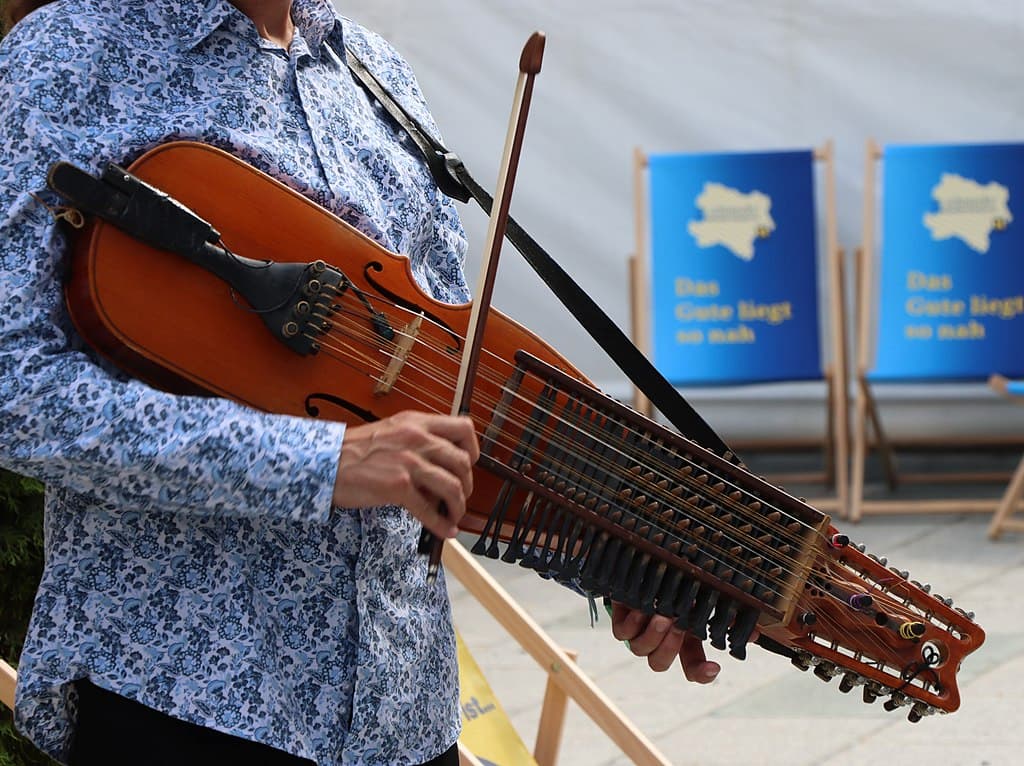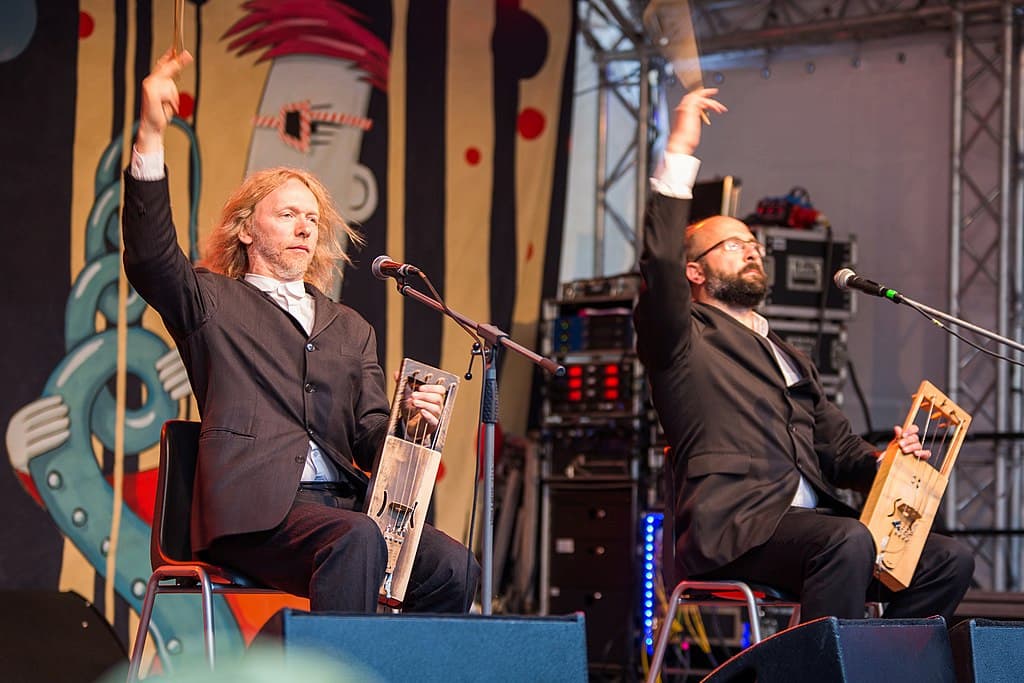If you saw the 2024 Eurovision Song Contest Grand Final in May, then you saw two different groups with instruments far out of the norm.
The Norwegian group Gåte played Ulveham (Wolf Pelt), which is based on a medieval Norwegian ballad about a maiden and her evil stepmother. Despite the maiden being turned into a needle, a knife, and then a sword, the people still love her due to her stepmother’s anger. Finally, her stepmother turns her into a wolf, and the wolf eats the stepmother. The modern version cuts many of the verses and cuts the ending short but still maintains a growly edge to the sound, especially at the end.
One of the instruments, along with guitar and drum, on the stage was the nyckelharpa.

Nickelharpa, 2022 (photo by Karl Gruber)
This is what’s known as a bowed chorodophone, i.e., a stringed instrument that is sounded with a bow and has keys that change the key length. The instrument is also known as the keyed fiddle or key harp and is like a modified vielle or hurdy gurdy, where the rosined wheel is replaced here by a bow.
Gåte – Ulveham
Another group that used a folk instrument was the Estonian double group of 5MIINUST and Puuluup with the song (nendest) narkootikumidest ei tea me (küll) midagi (we don’t (yet) know anything about (these) drugs). 5MIINUST is a hip hop group and Puuluup is a ‘nu-folk’ duo, who play ‘neozombipostfolk’ (Neo-Zombie Post Folk). The song, written by both groups, the singer denies he knows anything about drugs since he’s so poor. At the same time, it’s a commentary on the poor being victimized by the police.

Puuluup, 2018
The instrument Puuluup is holding is known as the talharpa, a bowed lyre. Where a normal lyre would be plucked in the space between the body of the instrument and where the strings are attached at the head, the bowed lyre has an arched bridge that enables the use of a bow.
5MIINUST x Puuluup – (nendest) narkootikumidest ei tea me (küll) midagi
The Eurovision Song Contest, at its simplest, is an international song competition. At its most complex, it’s a political game of winners and non-winners, and points given and points not given- the infamous, or rather dreaded, ‘nul points’ (no points) was received by the UK this year from the televote. Established in 1956, it has been held annually (except for the 2020 COVID stop) and is the longest running international song competition on television. The rules invite a song of no more than 3 minutes, performed by a group of up to six people aged over 16. There are other rules, such as no mention of commercial products, which is why the competition piece by Finland’s Windows95man had all his Windows logos pixilated out and why other groups had to change their lyrics.
Voting is done by the 37 participating countries (Jury vote) and by the international audience (televote). Each country is given two sets 58 points to allot to 10 countries not their own as 1-2-3-4-5-6-7-8, 10, and 12 points. The two sets are divided between the jury and the televoting.
Competitors face an interesting question as they work their way through the quarter- and semi-finals that lead up to the Grand Final. Do they go international, i.e., screaming guitars, pounding drums, and English lyrics, or do they go local, with folk costumes, ethnic instruments, and local languages (often quite local: the early versions of Gåte’ Ulveham were written in the Telemark dialect before being written into standardized High Norwegian). This year, English was the predominant language, but 16 other languages were used, sometimes with English. Folk instruments, though, were rare.
Although the competition is really unknown in the US, internationally, it has one of the largest viewing audiences for a non-sporting event. It’s sponsored by the European Broadcasting Union, ‘is an alliance of public service media organisations whose countries are within the European Broadcasting Area or who are members of the Council of Europe’. This Swiss-based organisation was founded in 1950 and now has members from 56 countries. Eurovision isn’t its only production, they also sponsor the Eurovision Debates, held with candidates for the European Commission presidency, other Eurovision music and dance spin-offs, and radio programs such as Euroclassic Notturno, an overnight classical music stream.
It’s an interesting competition about national identity, the nature of pop music, and the ability to put a song across.
For more of the best in classical music, sign up for our E-Newsletter



